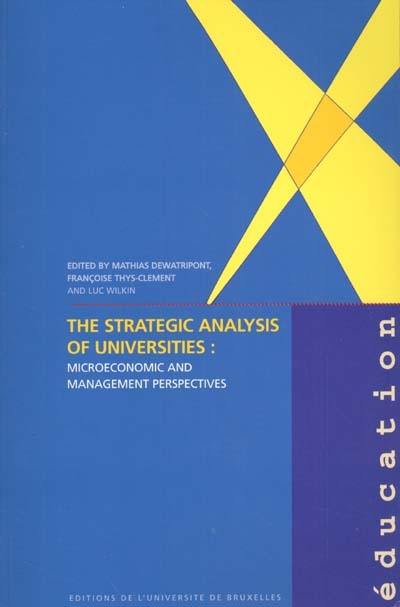
Fiche technique
Format : Broché
Nb de pages : XX-342 pages
Poids : 574 g
Dimensions : 16cm X 24cm
EAN : 9782800412511
The strategic analysis of universities
microeconomic and management perspectives
Quatrième de couverture
The séries ...
Everybody agrees that we live today in a "knowledge society" : one can discuss the exact nature of the societal changes, present and future, implied by the revolution in information technologies, but it is clear that knowledge is key to the elevation of well-being.
At a time where education reforms are numerous and hotly debated at all levels, the series "Education" directed by Françoise Thys-Clément allows researchers and actors of the educational world alike to present their analyses and proposals that build on the various scientific disciplines which consider the educational sector.
The book ...
Universities are central in the production and dissemination of knowledge, through their research and their training. It is thus vital for the whole process of knowledge acquisition in society to try to understand, and improve, the functioning of universities. Making progress on this front requires theoretical work as well as data collection and empirical testing. Various research questions have indeed to be addressed : First, how do universities, being non-profit institutions, come to determine their missions and their desired output mix ? Second, how do they balance the interests of their numerous "stakeholders" : students, professors, administrators, alumni, the Government and the public at large ? Third, how does the increased pressure they face for "accountability" affect their governance ? Finally, what lessons should we draw in terms of optimal university funding ?
These research questions have been at the heart of a multiuniversity project, with researchers from the Université libre de Bruxelles, the Katholieke Universiteit Leuven and the Université de Mons-Hainaut, funded by the Belgian Federal Government (under its PAI/IAP Programme). The project is interdisciplinary in nature, since it builds on academic expertise from members of the teams in microeconomic theory - in particular incentive theory, industrial economics and the theory of information-processing in organizations -, in strategic management theory, and in the economics of education. It also benefits from the practical management expertise of several team members, acquired both in academic and non-academic institutions.
This book provides a sample of research outputs from the project, with special emphasis on the strategic management of universities. It also includes a number of contributions that take a broader perspective, in order to illustrate the complementarities between the various approaches taken in the project.





